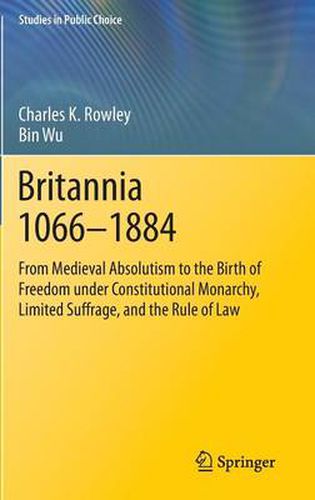Readings Newsletter
Become a Readings Member to make your shopping experience even easier.
Sign in or sign up for free!
You’re not far away from qualifying for FREE standard shipping within Australia
You’ve qualified for FREE standard shipping within Australia
The cart is loading…






This title is printed to order. This book may have been self-published. If so, we cannot guarantee the quality of the content. In the main most books will have gone through the editing process however some may not. We therefore suggest that you be aware of this before ordering this book. If in doubt check either the author or publisher’s details as we are unable to accept any returns unless they are faulty. Please contact us if you have any questions.
This book offers an analytic history of Britannia (first England and Wales and then Great Britain) over eight hundred years of political turmoil, intermingled with economic stagnation, followed by the engine of the industrial revolution. The book draws on economics, political science, public choice, philosophy and the law to probe in depth into the evolution of Britannia from an impoverished feudal and then post-feudal autocracy into a constitutional monarchy with limited suffrage that provided the fulcrum for industrial and commercial success, making Britannia, by 1884, the richest nation, per capita, on the planet. The book challenges head-on the Whiggist liberal notion of Macaulay and Trevelyan that the path from oppression to freedom was one of unimpeded progress. Among its novel features, the book draws upon the dictator’s handbook, as modeled by Bueno de Mesquita and Alistair Smith to evaluate the period of varying autocracy, 1066-1688. The book draws upon modern public choice theory and legal history to evaluate the fragile, corrupt constitutional monarchy that oversaw the initial phase of post-Glorious Revolution Britannia, 1689-1775. At each stage, the philosophical battle between those who sought order and unity and those who sought individual liberty is meticulously outlined. The book draws on the contributions of the Scottish Enlightenment (Hume, Ferguson and Smith) and of classical liberal philosophy (John Stuart Mill) to explain the final vault of Britannia from a weak and corrupt to a robust and admired constitutional monarchy grounded on the rule of law, over the period 1776-1884.
$9.00 standard shipping within Australia
FREE standard shipping within Australia for orders over $100.00
Express & International shipping calculated at checkout
This title is printed to order. This book may have been self-published. If so, we cannot guarantee the quality of the content. In the main most books will have gone through the editing process however some may not. We therefore suggest that you be aware of this before ordering this book. If in doubt check either the author or publisher’s details as we are unable to accept any returns unless they are faulty. Please contact us if you have any questions.
This book offers an analytic history of Britannia (first England and Wales and then Great Britain) over eight hundred years of political turmoil, intermingled with economic stagnation, followed by the engine of the industrial revolution. The book draws on economics, political science, public choice, philosophy and the law to probe in depth into the evolution of Britannia from an impoverished feudal and then post-feudal autocracy into a constitutional monarchy with limited suffrage that provided the fulcrum for industrial and commercial success, making Britannia, by 1884, the richest nation, per capita, on the planet. The book challenges head-on the Whiggist liberal notion of Macaulay and Trevelyan that the path from oppression to freedom was one of unimpeded progress. Among its novel features, the book draws upon the dictator’s handbook, as modeled by Bueno de Mesquita and Alistair Smith to evaluate the period of varying autocracy, 1066-1688. The book draws upon modern public choice theory and legal history to evaluate the fragile, corrupt constitutional monarchy that oversaw the initial phase of post-Glorious Revolution Britannia, 1689-1775. At each stage, the philosophical battle between those who sought order and unity and those who sought individual liberty is meticulously outlined. The book draws on the contributions of the Scottish Enlightenment (Hume, Ferguson and Smith) and of classical liberal philosophy (John Stuart Mill) to explain the final vault of Britannia from a weak and corrupt to a robust and admired constitutional monarchy grounded on the rule of law, over the period 1776-1884.